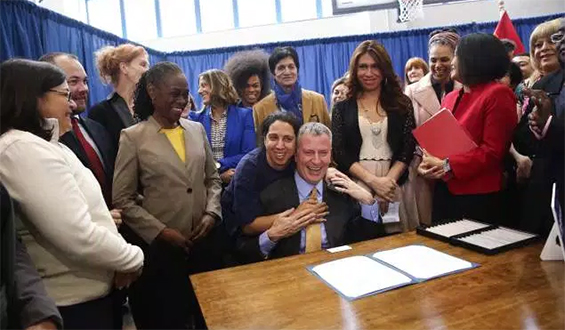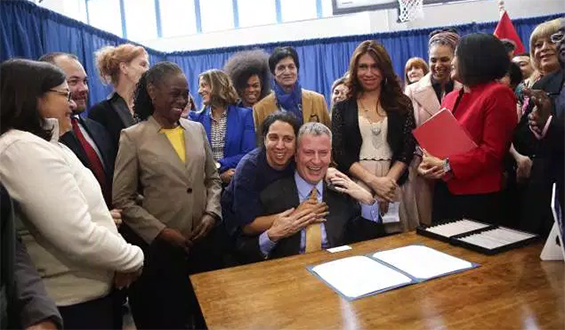
New York City Mayor Bill de Blasio has signed an order that will require that single-sex bathrooms be available to anyone who needs such accommodations regardless of gender.
A transgender activist in Queens, Bianey Garcia, told WPIX-TV of the time she was kept from using a women’s restroom at a restaurant. She explained that it was humiliating.
“I am a trans person. I don’t feel like a man in any way. I feel like a woman. I dress like a woman. So, you have to respect that,” Garcia said.
The new law will allow Garcia and the other 25,000 transgender and gender non-conforming persons in New York City to use bathrooms that are consistent with their gender identity. The measure will apply to city buildings, offices, public parks, pools, playgrounds, recreation centers, and some museums.
“This executive order will require the law to be posted clearly for the public and city employees to see,” Mayor Bill de Blasio said.
Another bill is pending which would require private buildings to supply gender neutral restrooms. Human Rights Commissioner Caemelyn Malalis said that an incident like the one that Bianey Garcia endured violates the city’s human rights laws.
“New York is a city for us all,” Malalis said.
Opponents of such a law have said the equal treatment is unsafe or inappropriate. De Blasio shared that NYC is the birthplace of the battle for LGBT rights, and it should be the city that leads the way in the march toward equality.
The Official Website of the City of New York discloses that a survey of LGBT people nationwide, conducted by the National Center for Transgender Equality and the National Gay and Lesbian Task Force, revealed that one in four of respondents stated they had been denied equal treatment. Subjects affirmed that they had been treated unequally in government agencies, retail stores, doctor’s offices, and hospitals.
Twenty-two percent reported being banned from gender appropriate restrooms at work, and 26% said they had not been allowed entry to bathrooms in educational settings.
Speaking from a city recreation center in Chelsea, de Blasio said:
“Change comes from the grassroots. Change comes from the ground, and if people who believe in human rights don’t stand up for them, it lets those negative voices dominate.”
The Observer’s Jillian Jorgensen reports that although city hospitals and public housing buildings are not required to follow the order because they are independent authorities, they have agreed to align with the order’s mandates.
Sean Coleman of Destination Tomorrow, an agency for LGBTQ people in the South Bronx, said at one time in his life, he would only leave his home for four hours at a time because he was afraid that he would not be given access to a public restroom.
Bradford Richardson, writing for The Washington Times, reports that critics of the bill maintain there will be critical issues as a result of the order. They bring up the possibility that young girls will be exposed to older men in changing rooms, or bystander intervention will be discouraged when potentially predatory men are seen using women’s bathrooms.
Joseph Backholm, executive director of the Family Policy Institute of Washington, contends that orders like the one signed by de Blasio do not allow for the fact that transgender people are not the only people who have rights that need to be guarded.
He explains that, for example, transgender people have rights to access public bathrooms, and everyone else has legal rights to privacy.
The order is the latest win for the intrepid transgender movement across the nation that is looking for public acceptance and recognition by being allowed access to sex-segregated conveniences.




